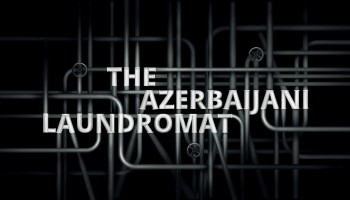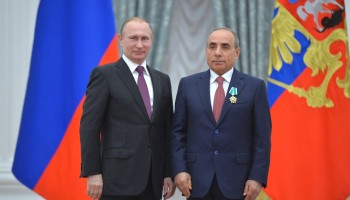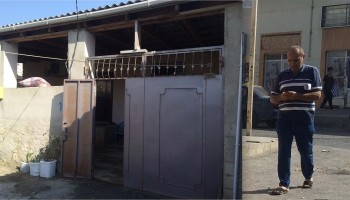From 2012 to 2014, even as the Azerbaijani government made wholesale arrests of activists and journalists, members of the country’s ruling elite were using a secret slush fund to pay off European politicians and other influencers who spoke favorably about the country and its oppressive regime.
Many of these efforts took place within the Council of Europe, a body whose aim is to uphold human rights, democracy, and rule of law. Azerbaijan, itself a member, is known for its aggressive efforts to deter the organization from criticizing its growing crackdown on human rights.
Important people who received Laundromat money included three former members of the Parliamentary Assembly of the Council of Europe (PACE): a German MP and a Slovenian politician who both went against international organizations to declare Azerbaijan’s elections fair and an Italian politician already charged with bribery related to these same payments. The Bulgarian husband of the head of the United Nations Educational, Scientific and Cultural Organization (UNESCO), a high-profile supporter of Azerbaijan, also received Laundromat payments.
One man at the core of the lobbying effort -- and at least some of the Laundromat payments -- is Elkhan Suleymanov, an Azerbaijani parliamentarian and PACE member. According to emails obtained by Italian police, Suleymanov was responsible for implementing an aggressive plan to improve the country’s image called “Azerbaijan 2020: Smile Future,” which was initiated in late 2011 by President Ilham Aliyev.
One Busy Day
An analysis of one fall 2013 day reveals how the slush fund was used and who was behind it.
On Oct. 25, a single bank account belonging to Polux Management LP, a core Laundromat company, made seven payments worth €478,000 ($660,000), including two to EU influencers. These payments are just a tiny fraction of the transactions that make up the Azerbaijani Laundromat, but they illustrate how it operated -- and who benefitted.
One payment of €61,000 ($84,000) -- described as being for “services” -- went to Eduard Lintner, a former German parliamentarian who belongs to the Christian Social Union (CSU) party in Bavaria, a member of the country’s governing coalition.
Between 1999 and 2010, Lintner was a PACE member who, at times, served on committees responsible for evaluating members’ human rights records. According to a 2012 article in Der Spiegel, Lintner said that one of the reasons he left was because “a group within the Council of Europe … wanted to rigorously denounce [Azerbaijan’s] alleged human rights violations.” He said he preferred to “usher [Azerbaijan] along in a supportive way.”
Two weeks before he got the Polux payment, Lintner had been in Azerbaijan, heading a team of German observers who were monitoring the country’s presidential election.
According to local civil society activists and independent international monitors, Azerbaijani elections are neither fair nor free, with President Aliyev regularly winning improbably large victories. This one was little different. In an embarrassing gaffe, a set of results were released on the election commission’s official smartphone app before the vote was even held. The government provided an unconvincing explanation which proved untrue.
The Organization for Security and Cooperation in Europe (OSCE) and the US Department of State called the election flawed, noting intimidation of the opposition and independent media and Aliyev’s near-total monopoly of coverage by state-controlled television. In the end, Aliyev was reelected with 84.5 percent of the vote. The election was widely considered, once again, to have fallen short of international standards.
Curiously, Lintner disagreed with the near-universal view of international organizations and had only words of praise for the process. “The election process itself was organized at a high level and meets such standards as in Germany, for example,” he said. “All procedures stipulated by the law were observed during voting at all the polling stations that we visited. Our team did not notice any irregularities.”
One person who disagreed with Lintner was Anar Mammadli, an Azerbaijan human rights activist and founder of the Election Monitoring and Democracy Studies Center in Baku. Following his team’s assessment of the elections as deeply flawed, Mammadli was arrested on Dec. 16 on charges of illegal entrepreneurship, tax evasion, and abuse of official authority.
Ironically, two days later, Hilux Services LP, another core Laundromat company, wired €41,000 ($56,000) to Lintner’s personal bank account.
Mammadli was sentenced to five-and-a-half years in jail in May 2014. His deputy, Bashir Suleymanli, was sentenced to three-and-a-half years. Mammadli was pardoned by the President in March 2016.
For Lintner, the Polux and Hilux payments were just two of many. He received a total of €819,500 ($1.1 million) in 19 installments between 2012 and 2014.
Lintner said the Laundromat money he received was funding for the Society for the Promotion of German-Azerbaijani Relations (GEFDAB), a Berlin-based organization he founded in 2009. He said the money came from the Association for Civil Society Development in Azerbaijan (ACSDA), a Baku-based NGO run by Elkhan Suleymanov, an Azerbaijani parliamentarian and PACE member.
Lintner told OCCRP’s partner, Suddeutsche Zeitung, that GEFDAB needed the money to cover office costs in the government district, phone bills, events “around the Parliament,” and two temporary employees that he would not name. “We kept what was left, it was a quasi-budget,”he said.
Regarding his 2013 election monitoring, he said: “It's not important who pays, it's important what rules the observation follows … The OSCE always comes to different results, because they take long-term observations into account. We only observed the election day and the ballot-counting process.”
An International Fan
The payments to Lintner were not the only example of Laundromat payments to people who say and do good things for the country. On the same October day Lintner got paid, Polux sent €20,000 ($27,000) to Kalin Mitrev, the husband of UNESCO Director-General Irina Bokova, for “supervision services.”
Bokova has been one of Azerbaijan’s most high-profile supporters. On Oct. 22, 2013, UNESCO hosted a photo exhibition called “Azerbaijan -- Land of Tolerance” at its headquarters in Paris. The event was held at the request of the Heydar Aliyev Foundation, which is chaired by Azerbaijan’s first lady, Mehriban Aliyeva. It was one of many events UNESCO hosted that highlighted Azerbaijan’s culture.
Such cultural exhibitions are not as innocuous as they may seem. Promoting itself as a tolerant country is a tactic through which the Azerbaijani government ingratiates itself with the West and deflects criticism of its human rights record. That an organization as well-known as UNESCO would host such an event at a time when Azerbaijan was arresting dozens of civil society activists was unusual, and was criticized at the time.
Bokova has ignored all criticism and maintains a friendly relationship with the Aliyevs. She was a regular guest in Baku and in 2010, she bestowed a UNESCO honor, the Mozart medal, on Mehriban Aliyeva, Azerbaijan’s first lady (who, since February, has also been the country’s vice president). The Aliyevs have been generous in return, including setting up a $5 million Azerbaijan/UNESCO Trust Fund to support events.
As Aliyev was celebrating his victory in the 2013 elections, many human rights activists his regime had arrested on trumped-up drug charges were languishing in jail. Meanwhile, Bokova gushed: “On the occasion of your resounding victory in the recent presidential election, I wish to present to you, on behalf of UNESCO and in my own name, heartfelt congratulations and best wishes for your continued success in the highest office of the Republic of Azerbaijan.”
The payment Mitrev received on Oct. 25 was just one of six. He received a total of €345,000 ($468,000) between 2012 and 2014 from three Laundromat companies to accounts in Bulgaria and Switzerland. An additional €40,000 did not arrive in his account after two attempts to make the transaction were rejected by Deutsche Bank “due to sensitivities.” Under current anti-money laundering legislation, banks must reject suspicious transactions. At the time of the payments, Mitrev was a private businessman. Today, he is a director of the European Bank for Reconstruction and Development (EBRD).
In a written response to reporters’ questions, Mitrev said that the payments were legitimate compensation for work he had performed for an Azerbaijani company called Avuar-Co.
“The payments you inquire about were for consultancy work from May 2011 to April 2014 with the local company Avuar-Co LLC from Baku,” he wrote. “The company was working with the Ministry of Emergency Situations (MES) of Azerbaijan on a major government programme for the mitigation and prevention of the disastrous floodings in the Kura-Aras river basin.”
The Kura and Aras rivers flooded in 2010, destroying or damaging some 20,000 homes. The government would spend more than 460 million AZN ($590 million) -- the exact amount is not known because some of the allocations were secret -- to rebuild and to stop future flooding. But local residents and NGOs said that the project was deeply corrupt, non-transparent, and ineffective. Some 119 flood victims sued the MES. Their case is in the European Court.
Mitrev went on to describe his work: “The programme involved a wide array of activities and required coordination of large number of public and private entities, both from the country and from abroad, as well as multilateral financial institutions and donors.”
But this explanation appears to contradict the official records.
Avuar-Co, which was formed five months after the floods occurred, did receive tenders from the MES, which was in charge of the flood project, but none appear to relate to the work Mitrev describes. According to Azerbaijani government data, Avuar-Co won only four ministry tenders worth just 383,000 AZN ($478,000), somewhat less than the amount Mitrev was paid.
In addition, all four tenders were described as being for the acquisition of equipment, including a mobile kitchen -- not for consulting.
The company did win another 1.6 million AZN ($2 million) in other contracts with other government agencies from 2011 to 2014, but these, too, do not appear to have any connection to the flooding project or any associated consulting. They were all for widely varying equipment purchases such as furniture, construction materials, wiring, and spare parts.
This information is is not definitive, as Azerbaijani records are sometimes incomplete, especially when they involve high ranking officials.
But there is other evidence that raises suspicions about Avuar-Co’s business. It is not mentioned by other companies in subcontracting data, it has no website, there are no mentions of it in local media, and its only presence on the internet relates to the few deals described above. It looks more like a paper company than a real commercial concern.
Avuar-Co is problematic in other ways too. It was registered at the same address as six other companies on the same day as four of them. One of these companies shows up in the court records of a high-profile corruption trial in which it is shown to be a paper company run by a proxy.
The MES is also a notoriously corrupt agency that, in the US State Department’s WikiLeaks cables, is mockingly described as “The Ministry of Everything Significant.” The minister’s son runs the European Azerbaijan Society (TEAS), an NGO that, among other things, sponsors luxury trips to Azerbaijan for European politicians. The organization’s message on Azerbaijan reliably toes the state line.
Mitrev said he does not know why he was paid by the Laundromat companies, but referred reporters to an e-mail address he said belonged to Avuar-Co. Writing from that address, a person who introduced himself as Agaselim Seidov, the director of Avuar-Co, said that the three offshore companies had debts to his company and that he used these debts to pay Mitrev for his services. He refused to say what type of business his company had with the British offshores. (See Avuar-Co's response)
Avuar-Co’s records do list Seidov as the company’s director. Seidov’s name is unique in Azerbaijan and reporters tracked down his Facebook profile, finding that he lived in Mashtaga, a poorer outlying area of Baku.
They subsequently contacted him and arranged a call. But, though he immediately confirmed that he was the company’s director, they found him to be a very different person than the eloquent, English-speaking businessman who had written the emails. He said he has no knowledge of the flood project and that had not written the e-mail to OCCRP.
Mitrev did not answer whether his wife knew about these payments and did not reveal the names of the persons he dealt with at Avuar-Co. (See Mitrev's response)
In response to questions from OCCRP’s partner Berlingske, Bokova wrote: “I most vehemently deny any wrongdoing and will consider defamatory any publication of these totally unfounded conjectures on your part.” (See Bokova's response)
“I am not privy to the details of my husband’s consulting business and equally, your questions about my opinion on Azerbaijan and its leadership are wholly misplaced. As a Director General of a UN agency, my duty is to develop sound working relations with all members of the organisation in conformity with the policies, set by member States. Azerbaijan is not an exception in this respect,” she wrote.
The Italian Connection
Another European politician, Luca Volonte, an Italian parliamentarian and the former chair of the European People's Party group in PACE, received payments through the same companies that paid Lintner and Mitrev. In fact, in several instances, all three got Laundromat money on the same day. Volonte received €1.99 million ($2.64 million) in 19 installments via his Italy-based Novae Terrae foundation. His Italian company, L.G.V. S.r.l., also got €180,000 ($234,000) from one of the Laundromat’s companies.
Volonte faces corruption charges in Italy in relation to these payments. Prosecutors claim he was working to undermine a PACE report that condemned Azerbaijan for holding political prisoners and other human rights violations. On Jan. 23, 2013, the assembly voted against endorsing the report in a 125-79 vote with 20 abstentions.
A month earlier, Volonte’s foundation received €100,000 ($129,886) from Metastar Invest LLP, one of the four Azerbaijani Laundromat shell companies. Volonte’s other pro-Azerbaijan lobbying was detailed in the comprehensive “Caviar Diplomacy” report by the European Stability Initiative.
According to the Italian prosecutors, Volonte was directly involved in the making of the "Azerbaijan 2020: Smile Future”-- a project meant to relaunch Azerbaijan’s international image. This project was authorized personally by President Ilham Aliyev. According to the Italian indictment, Volonte was brought into the project by Suleymanov – the same PACE representative who funded Lintner’s pro-Azerbaijan NGO.
This is confirmed by the intercepted email exchanges between Volonte, Suleymanov and their assistants that were used by Italian prosecutors to build the case against Volonte. The emails show that Suleymanov used the four Laundromat companies to pay for Volonte’s services.
Volonte denies any wrongdoing.
More Money -- And More Election Praise
Lintner and Volonte are not the only European politicians to receive Azerbaijani money. The president of the Slovenian National Party and former substitute at PACE, Zmago Jelincic Plemeniti, got €25,000 ($31,820) from Metastar in July 2012. Plemeniti will be a candidate in the Slovenian presidential elections this October. He ran in 2002 and 2007, winning 8.5 and 19 percent of the vote on a nationalistic platform.
Plemeniti acted as an observer in three Azerbaijani elections: in 2005, 2010 and 2013.
After Aliyev’s victory in 2013, he had words of praise: “This victory confirms the approval of the people of Azerbaijan of the great successes achieved and their active support for the policies aimed at the development of the country in all spheres of life. At the same time, the leadership of President Ilham Aliyev will strengthen Azerbaijan’s positions in the international arena.”
Plemeniti told OCCRP that the money was paid for the translation into Russian of a Slovenian book, “Ukana,” by Tone Svetina. The book is about Mehdi Huseynzade, an Azerbaijani guerrilla and scout during World War II who fought the Nazis with Plemeniti’s father and was buried in Slovenia.
The Price of Pretty Words
The Azerbaijani Laundromat did not pay only politicians. It was also utilized to buy and disseminate favorable media coverage.
In 2014 Eckart Sager, a former CNN producer, received nearly €2 million ($2.6 million) in his United Arab Emirates bank account from Hilux Services LP. He is listed as a press contact for public relations articles) that promote the Azerbaijani government’s views. One of these articles voices Azerbaijan’s denials in the Luca Volonte case.
The article quotes Elkhan Suleymanov, the same Azerbaijani parliamentarian who paid both Lintner and Volonte, as saying: “Unfortunately, those who attack Azerbaijan without reason for a slander and smear campaign are often regarded as heroic fighters, and it has once again become clear that this unscrupulous slander and smear campaign against my country was part of a vast international conspiracy, organized by economic powers abroad to destabilize Azerbaijan.”
Sager previously ran into controversy when his TV production company, FBC, made documentaries for the BBC about Malaysia’s palm oil industry and the associated environmental and human rights issues while being paid by the Malaysian government.
And it’s not just media people who got paid. Mario Palmonella, an Italian architect, got money from the same Hilux company for architectural planning work in Azerbaijan. He also co-signed an open letter that started: “We are all Azerbaijanis!!! This is the call expressed in an open letter of the Italian community in Baku. In the letter the Italians living in Azerbaijan express their indignation at the smear campaign against Azerbaijan in the Western mass-media.”
Along with a group of Romanian architects, Palmonella carried out several projects in Azerbaijan, including the 7 Hills development financed in part by the International Bank of Azerbaijan.
The architect and family members were paid multiple times from the Azerbajani Laundromat, receiving more than €57,500 ($74,000) in their Romanian and Italian bank accounts. He told OCCRP that he is aware of Azerbaijan’s human rights problems, but that he felt that signing the letter was the cost of doing business in Azerbaijan.
The 7 Hills development was never completed.
Other Laundromat Payments
Not all the money was paid to people favorable to the country.
On Oct. 25, a Dutch company selling fresh flowers was wired €5,000 ($6,600) and an Italian clothing company specializing in high-end, luxury cashmere and wool products received €1,672 ($2,261). By the end of the day, the Polux account was left with less than one Euro.
This pattern recurs, as in many instances the Azerbaijani Laundromat accounts are filled up at the beginning of a day and left empty by the end of it, so that the day’s expenditures are easy to see.
The half-a-million euros paid out on Oct. 25 are just a drop in the bucket. Overall, the Laundromat paid out $2.9 billion between 2012 and 2014. Some of it was spent on German luxury cars, Italian clothing, or French perfumes, though it’s not clear who ultimately received these items.
This story is part of the Global Anti-Corruption Consortium, a collaboration started by OCCRP and Transparency International. For more information, click here.
Correction and clarification (Sept. 11, 2017): The story has been corrected and clarified to reflect the fact that Kalin Mitrev received a total of €345,000 from the Azerbaijani Laundromat. OCCRP regrets the error.








